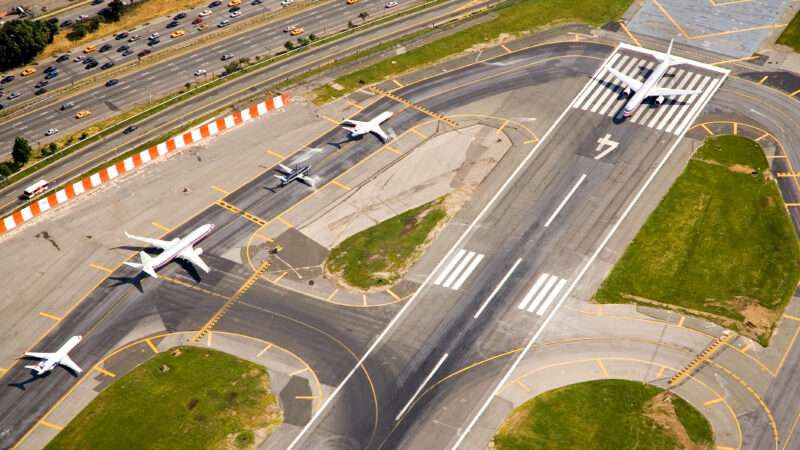
Congress has passed a five-year, $105 billion Federal Aviation Administration (FAA) reauthorization bill that will make it easier to install new air traffic control technology, and make it harder for small-time travel agents to earn a living, but otherwise leaves aviation regulation more-or-less unchanged.
"This could have been much worse," says Marc Scribner, a transportation researcher at the Reason Foundation (which publishes this website). "It's not a great bill, but from what we could reasonably expect in the first reauthorization bill after COVID, it's hard to see Congress doing anything all that dramatic."
The House voted 387–26 in approval of the bill, days after the Senate passed it on a vote of 88–4, reports The New York Times.
During COVID, Congress appropriated a massive amount of money for airlines and airports. The major commercial airlines received $54 billion in bailouts across three separate aid bills. The massive infrastructure bill passed in 2021 also gave airports $25 billion to build and maintain their facilities.
As the Congressional Research Service notes, these direct taxpayer airport subsidies were a departure from the standard practice of funding aviation infrastructure with "user taxes and fees."
The bailouts and subsidies were based on the assumption that there would be a prolonged slump in demand for air travel, threatening the ability of airlines and airports to support themselves off ticket revenue and user fees.
As it happens, the airline industry has bounced back pretty quickly. Airline profits were way up last year. Transportation Security Administration (TSA) checkpoint data show travel volumes are surpassing pre-pandemic levels.
With this year's reauthorization bill, Congress was attempting to "get its bearings" by largely preserving the status quo, says Scribner. The most positive change is the bill's easing of regulations on remote air traffic control technology, he says.
A growing trend in Europe is to move air traffic controllers into remote air traffic control centers, which use infrared cameras and other digital technology to monitor flights. This improves controllers' ability to monitor air traffic in cloudy or bad weather.
The centers are also much cheaper to build, making it financially feasible to install this digital control technology at smaller airports that can't currently justify the cost of building a traditional, windowed control tower.
Because they don't need to be at the actual airports, these remote air traffic control centers could be set up to monitor traffic at multiple airfields at once.
In Europe, remote air traffic control technology is tested at the airports where it's going to be deployed. However, the FAA requires that this technology go through a yearslong vetting process at an FAA facility in New Jersey. That adds significant time and cost to its deployment.
The new FAA bill requires the agency to figure out how to test this technology outside that New Jersey facility. That will hopefully get the FAA to "take the hint" and start letting this technology be vetted at airports themselves, says Scribner.
The biggest critics of the new FAA bill are smaller travel agents, who say the fine details of some of the bill's "consumer protections" could put them out of business.
In April 2024, the Biden administration finalized regulations requiring that airlines issue automatic cash refunds to customers who'd had their flights canceled. If their tickets were purchased through a travel agent, the travel agent is responsible for providing the refund.
The trouble is that airlines are not required to immediately refund the travel agent for canceled flights, setting up situations where a travel agent might have to automatically dispense refunds out of their own pocket before they've been compensated by the airline. For a small travel agency refunding blocks of tickets at once, those costs could be ruinous.
Travel agents had been hoping the FAA bill would fix this issue. Instead, it's codified the existing rules into law.
"Travel agencies are not positioned to float the kind of financial obligations that policymakers are strapping on their backs," said Zane Kerby, president and CEO of the American Society of Travel Advisors, in a statement. "In the end, the consumer suffers, as travel advisors will be less inclined to book airfare, leaving the flyer without an advocate when travel plans go south."
The FAA reauthorization is also littered with missed opportunities.
It does not take up longstanding reform proposals to spin off air traffic control operations into an independent government entity or private nonprofit—an arrangement common in most other developed countries.
Proponents of an independent air traffic control entity say it would allow for quicker deployment of new technology and solve the conflict of interest created by the FAA both regulating and operating air traffic control.
The bill doesn't make any progress on privatizing airports. It doesn't give airports more flexibility to raise passenger facility charges that fund airport facilities. It doesn't touch onerous flight hour requirements that are contributing to a growing pilot shortage.
The FAA and most federal aviation programs have to be reauthorized every five years. The last reauthorization bill was passed in 2018. Congress has been making do with short-term extender bills since 2023.
The most recent short-term extension will expire Friday. President Joe Biden is expected to sign the bill into law before then.
The post Congress' FAA Reauthorization Is Good for Remote Towers, Bad for Travel Agents appeared first on Reason.com.







